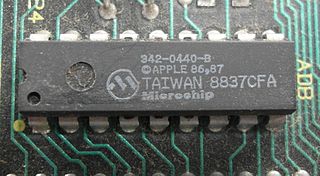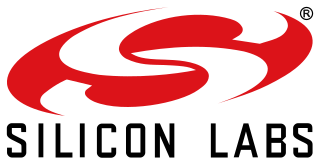
Wi-Fi is a family of wireless network protocols based on the IEEE 802.11 family of standards, which are commonly used for local area networking of devices and Internet access, allowing nearby digital devices to exchange data by radio waves. These are the most widely used computer networks in the world, used globally in home and small office networks to link devices together and to a wireless router to connect them to the Internet, and in wireless access points in public places like coffee shops, hotels, libraries, and airports to provide visitors with Internet connectivity for their mobile devices.
Atmel Corporation was a creator and manufacturer of semiconductors before being subsumed by Microchip Technology in 2016. Atmel was founded in 1984. The company focused on embedded systems built around microcontrollers. Its products included microcontrollers radio-frequency (RF) devices including Wi-Fi, EEPROM, and flash memory devices, symmetric and asymmetric security chips, touch sensors and controllers, and application-specific products. Atmel supplies its devices as standard products, application-specific integrated circuits (ASICs), or application-specific standard product (ASSPs) depending on the requirements of its customers.

The Wi-Fi Alliance is a non-profit organization that owns the Wi-Fi trademark. Manufacturers may use the trademark to brand products certified for Wi-Fi interoperability. It is based in Austin, Texas.

Nordic Semiconductor ASA is a Norwegian fabless technology company specializing in designing ultra-low-power wireless communication semiconductors and supporting software for engineers developing and manufacturing IoT products.
Digi International is an American Industrial Internet of Things (IIoT) technology company headquartered in Hopkins, Minnesota. The company was founded in 1985 and went public as Digi International in 1989. The company initially offered intelligent ISA/PCI boards with multiple asynchronous serial interfaces for PCs. Multi-port serial boards are still sold, but the company focuses on embedded and external network communications as well as scalable USB products. The company also sells radio modems and embedded modules based on LTE (4G) communications platforms.

Z-Wave is a wireless communications protocol used primarily for residential and commercial building automation. It is a mesh network using low-energy radio waves to communicate from device to device, allowing for wireless control of smart home devices, such as smart lights, security systems, thermostats, sensors, smart door locks, and garage door openers. The Z-Wave brand and technology are owned by Silicon Labs. Over 300 companies involved in this technology are gathered within the Z-Wave Alliance.

Telit Cinterion is an Internet of Things (IoT) Enabler company headquartered in Irvine, California, United States. It is a privately held company with key operations in the US, Brazil, Italy, Israel, and Korea.
Qualcomm Atheros is a developer of semiconductor chips for network communications, particularly wireless chipsets. The company was founded under the name T-Span Systems in 1998 by experts in signal processing and VLSI design from Stanford University, the University of California, Berkeley, and private industry. The company was renamed Atheros Communications in 2000 and it completed an initial public offering in February 2004, trading on the NASDAQ under the symbol ATHR.
Machine to machine (M2M) is direct communication between devices using any communications channel, including wired and wireless. Machine to machine communication can include industrial instrumentation, enabling a sensor or meter to communicate the information it records to application software that can use it. Such communication was originally accomplished by having a remote network of machines relay information back to a central hub for analysis, which would then be rerouted into a system like a personal computer.
Devicescape is an American developer of client/server software services for wireless networking connectivity, analytics, and context-awareness. Founded in 2001 as Instant802 Networks, the company was renamed to Devicescape in January 2005. Devicescape is a venture backed private company.

Microchip Technology Inc. is a publicly listed American corporation that manufactures microcontroller, mixed-signal, analog, and Flash-IP integrated circuits. Its products include microcontrollers, Serial EEPROM devices, Serial SRAM devices, embedded security devices, radio frequency (RF) devices, thermal, power and battery management analog devices, as well as linear, interface and wireless products.

Ceva Inc. is a publicly listed semiconductor intellectual property (IP) company, headquartered in Rockville, Maryland and specializes in digital signal processor (DSP) technology. The company's main development facility is located in Herzliya, Israel and Sophia Antipolis, France.

Sierra Wireless is a Canadian multinational wireless communications equipment designer, manufacturer and services provider headquartered in Richmond, British Columbia, Canada. It also maintains offices and operations in the United States, Korea, Japan, Taiwan, India, France, Australia and New Zealand.

Silicon Laboratories, Inc. is a fabless global technology company that designs and manufactures semiconductors, other silicon devices and software, which it sells to electronics design engineers and manufacturers in Internet of Things (IoT) infrastructure worldwide.

An RF module is a (usually) small electronic device used to transmit and/or receive radio signals between two devices. In an embedded system it is often desirable to communicate with another device wirelessly. This wireless communication may be accomplished through optical communication or through radio-frequency (RF) communication. For many applications, the medium of choice is RF since it does not require line of sight. RF communications incorporate a transmitter and a receiver. They are of various types and ranges. Some can transmit up to 500 feet. RF modules are typically fabricated using RF CMOS technology.

Redpine Signals is a fabless semiconductor company that started its operation in 2001. The company makes chipsets and system-level products for wireless networks. It serves the Internet of Things and wireless embedded systems market, enabling all volume levels of chipsets and modules.
GainSpan, a San Jose, California-based semiconductor company, designs and markets wireless connectivity products. It offers Wi-Fi chips, software, and embedded Wi-Fi modules. The company provides Wi-Fi technology for the residential housing, healthcare, and smart energy industries.
Thread is an IPv6-based, low-power mesh networking technology for Internet of things (IoT) products. The Thread protocol specification is available at no cost; however, this requires agreement and continued adherence to an End-User License Agreement (EULA), which states that "Membership in Thread Group is necessary to implement, practice, and ship Thread technology and Thread Group specifications."

u-blox is a Swiss company that creates wireless semiconductors and modules for consumer, automotive and industrial markets. They operate as a fabless IC and design house.
Weave is a network application layer protocol and, in implementation, a comprehensive toolkit for building connected Internet of Things-class applications, with a primary and current focus on consumer and residential applications.










